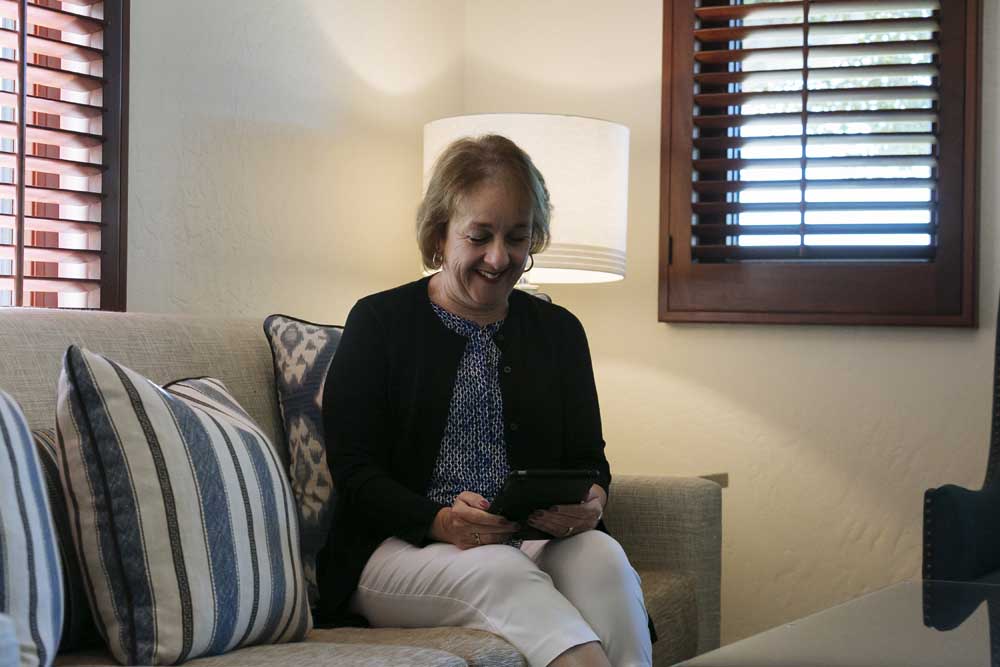Putting the front desk in the hotel guest’s pocket
Published 12:02 am Sunday, April 30, 2017

- Tina Amber uses the custom iPad at the Bacara Resort & Spa, in Goleta, Calif., April 1, 2017. The use of apps and other tech tools in the hotel industry has grown exponentially in the past five years as hoteliers seek new ways to meet the needs of guests, gain repeat customers, differentiate their brand and increase revenue. “I like the ability to do things with the click of a button,” Amber said. (Kayla Reefer/The New York Times)
When Lenette and Charlie Frye arrived recently at the Four Seasons in Orlando, Florida, for a two-night stay, they spotted an iPad loaded with the hotel’s app that they could use to order food, call for their car or read about activities in the hotel.
“You do it all yourself,” said Lenette Frye, 30, who manages a student living community in Gainesville, Florida. She and Charlie Frye, 35, a consultant for the University of Florida and former professional football player, travel frequently and liked the convenience of not having to pick up the phone.
While apps are not new in the hotel industry, the use of them and other tech tools has grown exponentially in the last five years as hoteliers seek new ways to meet the needs of guests, gain repeat customers, differentiate their brands and, ultimately, increase revenue.
And since the hotel tools are available at all hours, hotel experts say they may go a long way toward keeping guests happy and avoiding negative reviews on social media and websites like TripAdvisor.
Hotels are spending as much as 6 percent of total revenue on technology, according to Hospitality Technology’s 2017 Lodging Technology Study. Titled “Frictionless Hotels: Enabling the Omni-Experience,” the study said that 57 percent of hotels planned to spend more on technology this year than they did in 2016, while 42 percent planned to spend about the same and just 2 percent said they would decrease their IT spending.
Hotel occupancy rates in the United States are at 65.5 percent, the highest since 1984, said Bjorn Hanson, a professor of hospitality and tourism at the Tisch Center of New York University. Though they had typically been slow to adopt new technologies, hotels are seeing a place for tech tools.
“They’re trying to improve the guest experience by doing things on the guests’ terms instead of the hotel’s,” said Gregg Hopkins, chief sales and marketing officer for Intelity Corp., which creates technology products for hotels, including companies like the Four Seasons, Loews, Conrad and Pacific Hospitality Group. “It drives loyalty and drives repeat business and drives revenue.”
“Hotels need to stay engaged with the guest from the time they make the reservation until they check out and check in again,” Hopkins said.
In the past five years alone, communication with Marriott International from mobile devices has quadrupled, said George Corbin, senior vice president for digital at the hotel chain. In addition, 75 percent of all Marriott guests used a smartphone, tablet or laptop during their most recent stay. “This space is moving so fast,” he said. “We sort of take a bite at a time” in refining technology developments.
And that is indicative of what is happening in the hotel industry. Marriott was among the early technology adopters, having introduced an app in early 2012 that offered the ability to book a hotel room. Since then, the company has added features that allow guests to use the app to check in and check out; receive an alert when a room is ready; make requests of the hotel staff; and, in at least 500 locations, to unlock a room.
Technology also helps to resolve problems. A quarter of Marriott’s guests have an issue, problem or question during their stay, Corbin said. But guests whose problems were solved the first time they contacted the hotel “report higher satisfaction than people who had no problem at all,” he said.
“This is where ‘mobile requests’ come in,” he added. “That thing in your pocket” — the smartphone.
Shayne Paddock, chief innovation officer for guest management solutions at TravelClick, an e-commerce service provider for hotels, said different guests wanted different things.
“For hospitality, you don’t want to lose the human element,” Paddock said. The aim is “to blend technology with the human side if you want to be successful in this space.”
Making things easier for guests is the goal, said Carol Beggs, director of technology at Chatham Bars Inn, a resort in Cape Cod, Massachusetts. “You can book online, not just rooms but everything else,” she added.
By May or June, Beggs said, she expects guests to be able to book “ancillary activities,” like a cabana or a sailboat, on the hotel’s website or app using “smartphones, laptop, phone, whatever method you want to use.”
Of course, Beggs said, “If the guest wants to speak to a particular person on the staff, nobody wants to take that away.”






